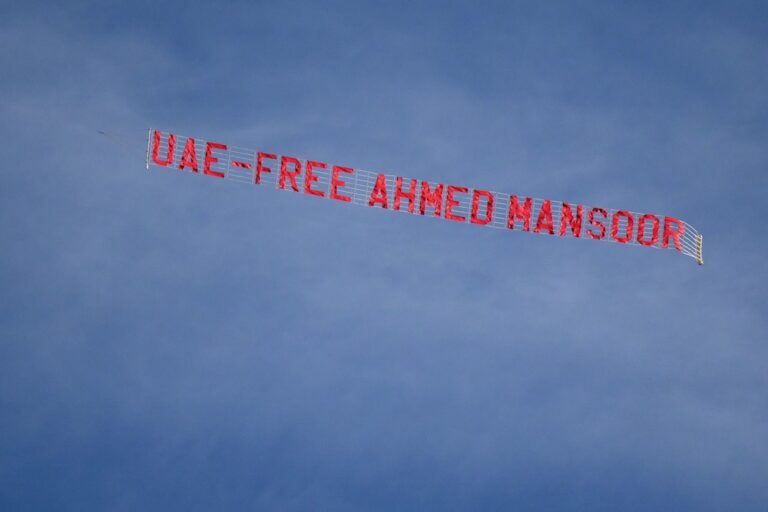The harassment of defense lawyers in the UAE is making it nearly impossible for detained peaceful dissidents to get access to a lawyer, Human Rights Watch said.
(Human Rights Watch/IFEX) – Beirut, August 14, 2012 – The United Arab Emirates’ crackdown on dissent has included the arrest and harassment of leading defense lawyers, making it nearly impossible for detained peaceful dissidents to get access to a lawyer, Human Rights Watch said today. The actions against the lawyers would make fair trials for detained dissidents impossible, Human Rights Watch said.
Since March 2012, the UAE has detained 51 men, including two prominent human rights lawyers, claiming that peaceful calls for reform threaten national security. With the latest arrests, authorities have compounded their disregard for free expression and free association by attempting to deny detainees legal assistance, an essential component of their right to a fair trial as well as the right of all detainees, Human Rights Watch said. Lawyers employed by the only Emirati law firm currently offering legal assistance to the detainees have been arrested, deported, and intimidated.
“By extending its crackdown against peaceful critics to include lawyers, the UAE is making even the basic rule of law impossible,” said Joe Stork, deputy Middle East director at Human Rights Watch. “The countries that provide the UAE with security assistance and businesses and institutions with close ties to the country should take note.”
On August 8, Dubai immigration officials arrested an Egyptian lawyer, Sameh Muktar, and informed him that he is to be expelled from the UAE on security grounds. Muktar works for a prominent Emirati lawyer, Abdulhameed al-Kumaiti, whose attempts to provide legal assistance to peaceful political activists in detention without charge in the UAE are being undermined by harassment and intimidation.
On July 17, authorities had arrested Salim Hamdoon al-Shehhi, an Emirati lawyer employed by al-Kumaiti, when he went to the office of the State Security Prosecutor to represent some of the arrested dissidents.
It is not clear what charges the men are likely to face or when. But an August 12 statement from the Emirates News Agency said that an investigation by the UAE attorney general into a number of individuals recently arrested, whom it does not name, revealed that they had “set up links with external elements and had worked in an organized and systematic manner, causing harm to the country and spreading false information in order to incite others against the country and to distort its shining image before the world.”
The authorities have previously deported two other Egyptian lawyers who worked for al-Kumaiti, Osama Labib in August 2011 and Mahmoud Badawi in October. In each case, the authorities refused to renew the men’s visas on security grounds, with no further reason given. The April 2011 decision to expel another employee, Khalid al-Dolaimi, an Iraqi lawyer, was reversed after he filed an employment case against al-Kumaiti’s office and changed employers. No details about this case are public.
Lawyers who have traveled to the UAE to offer legal assistance to the detainees have also been harassed. On July 24, a Qatari lawyer, Hassan al-Sayed, and a Kuwaiti lawyer, Ahmed Nashmi al-Dhufairi, who had come to UAE to advise the detainees, were subjected to an unusually extensive search of their personal computers and documents as they tried to leave the country. The search caused al-Dhufairi to miss his flight.
The detained men also include prominent lawyers – Mohammed al-Roken, a human rights lawyer and a member of the International Bar Association, and Mohammed al-Mansoori, a former head of the UAE Jurists’ Association. UAE authorities disbanded the board of the association in April 2011 after it co-signed a public appeal calling for greater democracy in the UAE. The authorities said that the Jurists’ Association had violated the 2008 Law on Associations, which prohibits organizations and their members from interfering “in politics or in matters that impair state security and its ruling regime.”
On August 11, the authorities moved six of the other detainees to an undisclosed location from al-Shahama jail in Abu Dhabi. The whereabouts of 47 of the 51 detainees are now unknown. The vast majority have been able to speak with their families by telephone, but the families do not know where the men are being held and the authorities have refused to disclose the men’s whereabouts to their families or legal representatives.
On August 8, the attorney general and the State Security Prosecutor’s office turned down al-Kumaiti’s requests to visit the detainees and to be present during their questioning. Senior legal figures within the UAE have advised family members of the detainees not to work with al-Kumaiti.
In 2011, al-Kumaiti and al-Roken served as co-defense counsel for activists known as the “UAE 5,” who were imprisoned for seven months in 2011 and prosecuted for allegedly posting statements on an internet forum critical of UAE government policy and leaders.
The provision of legal assistance of one’s own choosing is a necessary component of the right to a fair trial and the right to see a lawyer is a basic right of anyone detained. It is outlined in article 16 of the Arab Charter on Human Rights, which the UAE has ratified. The UAE violated that right directly by preventing physical access and indirectly by dissuading lawyers from offering their services. The UAE is also in violation of article 14 of the Arab Charter, which states that people subject to arrest and detention must be charged with a crime and brought promptly before a judge.
“The actions of the UAE authorities threaten to destroy the career of the only Emirati lawyer who is prepared to defend his countrymen’s right to free expression,” Stork said. “The governments that maintain close ties with the UAE should not keep silent in the face of these regressive tactics, which amount to an attack not just on these lawyers, but on the legal profession as a whole.”


